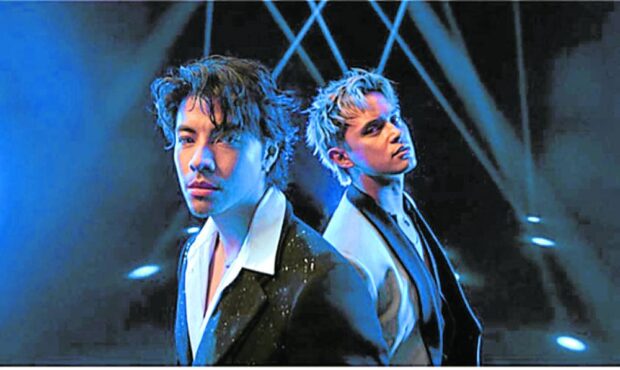James Reid and Benjamin Kheng talk about heartbreak in upbeat music

James Reid
It was just like talking shop with two very distinctive performers whose different musical tastes we admire. We’re talking about our two-on-one interview last week with Filipino Australian singer-actor James Reid and Singaporean singer-athlete Benjamin Kheng.
Like the diverse sounds they’re known for, James and Ben’s radio-ready collaborative single “Rock Bottom Blues”—dropped to streaming networks last July 28—benefits from its global appeal. The song is the first release from Ben’s eagerly anticipated two-part album “Gloomy Boogie”—which will be released later this month (Part 1) and in November (Part 2).
True enough, while each of James and Benjamin’s songs is as gorgeously realized as the next—like the former’s “Always Been You” and the velvety smooth “Soda,” and the latter’s “Baby Mama” and the catchy as all get-out “Good for a Time/Panandalian” (with Bea Lorenzo)—they also play out like apples and oranges.
And yet, with “Rock Bottom Blues,” Ben and James manage to find a complementary sound that plays well to their respective strengths and crowd-pleasing styles. Interestingly, it took the duo just a month to come up with the song after crossing paths for the first time in Singapore.
First encounter
“Obviously, the music of Lord James reaches many, so I was stoked to meet the man, the myth, the legend,” cool-as-a-cucumber Benjamin winkingly stated when we asked him how their collaboration came about. “He was in Singapore at the time, and there was a little get-together and he was really kind. He wanted to meet Singaporean musicians and I was there.
“He had heard of me prior to that and I’d heard of him. After we approached each other, the topic [of working together] came up, and I was like, ‘Would you be willing to do a track with me’—and he was down with the idea. It happened very quickly over a month, from planning and writing the song to recording it and shooting the music video. It was a quickie, but also a goodie (laughs).”
Chiming in, James said, “We didn’t even jump straight into music. At first, we talked about a whole bunch of other stuff, like traveling and hiking.”
We told James and Ben that even the song’s toe-tapping, booty-grooving music video—a hip and glossy production helmed by Barnabas Chua that easily plugs into the music-making zeitgeist—demonstrates how in sync their otherwise disparate artistic vibes are.
And that if we didn’t know better, it’d be easy to think that Ben’s musical impulses, as his song with Bea indicates, are as Pinoy as those of OPM’s hot-to-trot gatekeepers these days.
Tagalog coach
Cleverly catching on the “Panandalian” reference, Ben quipped, “Oh, I struggled hard [with its Tagalog lyrics]… I even had pronunciation coaches [to help see me through it].”
Steering us back to “Rock Bottom Blues,” James said, “It was an honor to work with Ben on this track. It was such a smooth working experience and we were just on the same wavelength. He’s very collaborative.
“‘Rock Bottom Blues’ is the single leading up to the release of Ben’s two-part debut solo album ‘Gloomy Boogie.’ He sent me the song and from the moment I heard it, I was like, ‘OK, this is a radio hit. He’s trying to go big. It was a very sad song, but with a very upbeat groove.”

Benjamin Kheng (left) and Reid in “Rock Bottom Blues”
Our Q&A with James and Benjamin:
You two cowrote this song—about the “rock bottom blues” that people go through before they move on from failed or toxic relationships—with Olivia Knox and Saint Kid. In what way do you personally relate to this particular theme?
Ben: OK, I’ll tell you something, guys. Everyone in Singapore is depressed, so we all relate to something like this. We just look very good on the outside, but we’re all broken on the inside. A lot of the more underground and indie music scene in Singapore is about depressing stuff like that.
It’s all danceable stuff, but lyrically, everyone’s going through stuff, man. And the more you push us into capitalism and progress as a society, the more people fall below the bar in terms of mental health. We’re all stuck in a rat race, dude… it’s so competitive out here—which might be good for business, but bad for mental health. That’s where musicians come in and do our thing.
James: It’s not that I’ve literally been in that exact situation, but when I was writing this and putting myself in that headspace, you really do feel like it couldn’t get much worse than this. Then, those very negative thoughts start creeping in and make you do stupid things, like push people away.
And that’s a very real situation that everyone goes through. Sometimes, even when you’re in a good situation in your life, those thoughts can creep in. That’s the kind of mindset and emotion that I definitely connected with.
The song is about heartbreak, but the catchy music that frames it is something that people can dance to. Was it a conscious decision for you to present that contrast between the downbeat theme and the mood-lifting upbeat music?
Ben: That’s the beauty of music. And that’s what gives a song so much depth, because if it’s sad-on-sad or happy-on-happy, it’s very one-tone. I’m not dissing Pharrell Williams’ “Happy,” but it’s very clear it’s doing just that.
The great thing about a song that sounds happy and then if you dig a little deeper and it turns out to be very sad is that it has so more “replayability.” It makes you want to go back and listen to the lyrics to understand where the writers were coming from.
And you can cover the song in many different ways because the lyrics just add more dimensions to that. Some of my favorite songs have that kind of polarity. And you know how we Asians are, we pretend we’re OK even when we’re not.
James: Yes, we tend to romanticize these things. But it also makes the song a little more complex … which the emotion really is. A lot of the time, when you’re in that emotion or situation, you’re trying to be happy. You’re not trying to show you’re sad. So, it’s that combination that makes it sound bittersweet, which is closer to what the song is about.
James, I’ve written about your music long before you were thrust into superstardom as an actor. How do you think has your music evolved since your debut EP in 2013? At the time, you even covered Michael Jackson’s “Rock With You”—a truly ballsy move. Your thoughts?
James: So much has changed honestly. There’s too much to even compress into just a couple of sentences. I was only 20 at the time (he’s 30 years old now)—and a lot has happened since. When I released that EP, while it was the kind of music that I wanted to do, I wasn’t really hands-on with my music back then.
It wasn’t something that I learned to engage with until 2017, when I released my album, “Palm Dreams”—in which I really wanted to try my hand at writing a 100-percent all-original full-length album completely. That kind of changed everything for me—a game-changer.
It was also the first time a major TV/movie actor in the Philippines had written, produced and performed in a full album, so people were kind of shocked to see that. It was the beginning of me trying to figure myself out as an artist wanting to have the sort of creative control I couldn’t exactly get from acting. And I’ve been pursuing that kind of creative release ever since.
Benjamin, “Rock Bottom Blues” isn’t the usual music that we hear from you. We’re also familiar with your Singaporean pop band The Sam Willows. Why did you decide to “diversify” musically for this project?
Ben: It’s similar to James’ story … besides not covering Michael Jackson because I couldn’t (laughs). But when I was just starting back in the day, my group [The Sam Willows] and I were chasing trends. My group got big from doing covers on YouTube, but we would do acoustic, “guitar-y” versions of songs from, say, Mumford & Sons.
But at some point, I wanted to stop chasing trends and do the kind of music I like. As an artist—and also being in your 30s—it’s a good thing when you know what you can and cannot do. For example, as much as I love R&B, I don’t think I could do it—it’s just not in my instrument to do it.
Like, sure I could try, but it won’t be anything like what James did with “Lovescene,” for example. Understanding my voice and its limitations and being OK with what you can’t do as an artist and acknowledging what you can is a big power as well. Moreover, I’ve always loved exploring genres and instrumentation.
I used to get very upset that I couldn’t sing this high or didn’t have vocal pipes like this or that, but you just learn to work with what’s given to you. And that’s why I always love these kinds of genres because there’s so much energy to them. You feel the guitars and drums [doing their thing], and you have James singing his butt off. So you also can’t help but feel all that energy.
James, how different is the satisfaction you get out of music compared to acting?
James: In my case, music has two parts. There’s the act of making music—like writing and recording. And then, there’s performing, which to me is closer to acting. With acting, there’s always a new experience that I’m having with each scene.
With music, it’s more like a reflection of my life and experiences. It’s more real to me…and very therapeutic. You’re creating it out of your inspirations and preferences—like those nostalgic R&B vocals of Michael Jackson or creating funk and all these sounds. With acting, I’m experiencing and living in someone else’s story.
Ben, what can your followers expect from “Gloomy Boogie”?
Ben: It’s just about learning how to be honest with myself. For most of my career, I found it hard to be honest—which sounds really strange, you know? While doing a bunch of different things, I just ended up saying stuff that people in Singapore expected me to say—like playing it safe or doing what was politically correct.
At this point in my career, it’s so cathartic to write from a place of honesty, no matter how dark the themes might be. But going into my 30s. I was like, “It’s now or never.” It’s great to feel that I can actually be honest about what I’m going through and actually get healing from it.
James, “Good for a Time,” your duet with Bea Lorenzo, demonstrates the border-breaching universality of music. After James and Bea, which other Filipino music artists do you wish to collaborate with?
Ben: Oh, I should stop being greedy (laughs). I mean, I can’t even believe I got to work with James and Bea, who are amazing artists. OK, I don’t expect to make it work, but I’m a big fan of Ace Banzuelo (“Muli”). I’ve caught him perform live, and he was shockingly good.
I’m also a big fan of Ben&Ben. Through the years, I got to meet them a bunch of times in Singapore and Manila. And I told them I’d be happy to play the triangle onstage or push the faders (laughs)—I can be the 10th man! It’s just so joyful what they do.